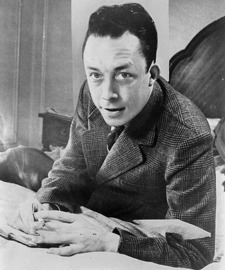en.wikipedia.org
Always private
DuckDuckGo never tracks your searches.
Learn MoreYou can hide this reminder in Search Settings
All regions
Argentina
Australia
Austria
Belgium (fr)
Belgium (nl)
Brazil
Bulgaria
Canada (en)
Canada (fr)
Catalonia
Chile
China
Colombia
Croatia
Czech Republic
Denmark
Estonia
Finland
France
Germany
Greece
Hong Kong
Hungary
Iceland
India (en)
Indonesia (en)
Ireland
Israel (en)
Italy
Japan
Korea
Latvia
Lithuania
Malaysia (en)
Mexico
Netherlands
New Zealand
Norway
Pakistan (en)
Peru
Philippines (en)
Poland
Portugal
Romania
Russia
Saudi Arabia
Singapore
Slovakia
Slovenia
South Africa
Spain (ca)
Spain (es)
Sweden
Switzerland (de)
Switzerland (fr)
Taiwan
Thailand (en)
Turkey
Ukraine
United Kingdom
US (English)
US (Spanish)
Vietnam (en)
Safe search: moderate
Strict
Moderate
Off
Any time
- Was this helpful?
- A comprehensive biography of Albert Camus, a French philosopher, author, journalist, and Nobel laureate. Learn about his life, works, ideas, and legacy in the context of his time and place.
britannica.com
7 days agoAlbert Camus was a French novelist, essayist, and playwright, best known for such novels as The Stranger (1942), The Plague (1947), and The Fall (1956) and for his work in leftist causes. He also wrote the influential philosophical essay The Myth of Sisyphus (1942). Camus received the Nobel Prize for Literature in 1957.Author:John Cruickshankbiography.com
Aug 8, 2023Albert Camus was a French Algerian writer best known for his absurdist works, including 'The Stranger' and 'The Plague.' He won the Nobel Prize for Literature in 1957.plato.stanford.edu
Stanford Encyclopedia of Philosophy
https://plato.stanford.edu › entries › camus
Albert Camus (1913-1960) was a journalist, editor and editorialist, playwright and director, novelist and author of short stories, political essayist and activist—and, although he more than once denied it, a philosopher. He ignored or opposed systematic philosophy, had little faith in rationalism, asserted rather than argued many of his ...iep.utm.edu
Internet Encyclopedia of Philosophy
https://iep.utm.edu › albert-camus
Learn about the life, literary career, and philosophical ideas of Albert Camus, a French-Algerian journalist, novelist, and Nobel laureate. Explore his concepts of the Absurd and Revolt, his views on colonialism and Algeria, and his legacy in moral philosophy.nobelprize.org
Learn about the life and work of Albert Camus, a French writer of Algerian origin who explored the themes of the absurd and revolt in his novels and essays. He received the Nobel Prize in Literature in 1957 for his contribution to non-metropolitan French literature.britannica.com
7 days agoLearn about the life and achievements of Albert Camus, a Nobel Prize-winning novelist and philosopher who explored the themes of existentialism, absurdism, and humanism. Explore his major works, such as The Stranger, The Plague, and The Myth of Sisyphus, and his influence on literature and politics.britannica.com
Learn about the life and works of Albert Camus, a Nobel Prize-winning Algerian-French writer who explored themes of alienation, absurdity, and resistance. Find out his biography, major novels, essays, plays, and more.nobelprize.org
Albert Camus made his debut in 1937, but his breakthrough came with the novel L'étranger (The Stranger), published in 1942. It concerns the absurdity of life, a theme he returns to in other books, including his philosophical work Le mythe de Sisyphe (The Myth of Sisyphus). Camus also worked as a playwright and journalist.camus-society.com
camus-society.com
https://www.camus-society.com › camus-works
A comprehensive list of the major works by Albert Camus, a French author, playwright, journalist and political activist. Find his novels, short stories, plays, essays, non-fiction, notebooks and letters.Can’t find what you’re looking for?
Help us improve DuckDuckGo searches with your feedback
